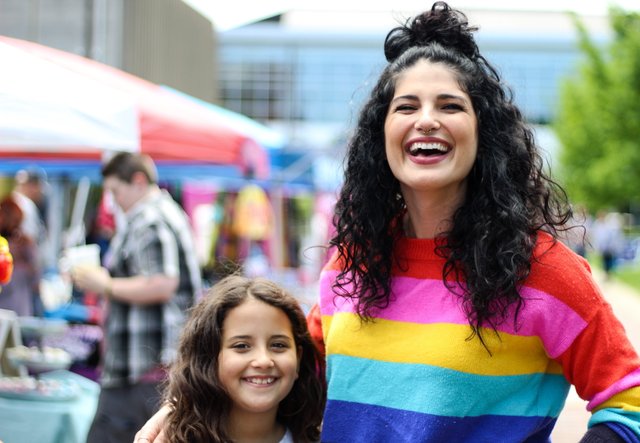
"Mom, Dad, I'm Lesbian/Gay/Bisexual/Transgender"
Even if you think that you will never hear this sentence, it is worth reading a few tips on how to react correctly, because we cannot be completely sure of anything in life. In addition, the messages that I am going to include in this post are quite universal and may be useful to you in other surprising situations.
First of all, you need to understand that a child who confesses to you that he or she is non-heteronormative is putting a lot of trust in you. You can answer, for example, "thank you for telling me this, how are you feeling now?" or ask "what kind of support do you expect? What can I do for you?"
Such a confession can be surprising at times, and by responding swiftly, we are more likely to make mistakes. So you can ask for the discussion to be postponed or for more details - you have every right to do so. Say:
"You surprised me. I have to sort it out in my head. Can we come back to this discussion later? "
"Can you explain to me exactly what that means? How do you understand it and how long have you known it? "
You have the right to experience all emotions, not only positive, such as pride of a child who trusted you or joy that you are close enough to him to hear about his sexual orientation, but also negative ones, such as sadness or fear related to potential exclusion which your child may meet. Remember, however, that it is better to work through negative emotions in a psychological office or in a support group (for example, associating parents of LGBT people). If you share your negative emotions with your child, you can hurt them.
You may have many questions
Why has this happened to my child? Why is he telling me this now? What have I done wrong? Why didn't I notice before? Remember that these thoughts are dictated by social stereotypes - your child is normal, so you did not do anything wrong and you did not notice, because there are no significant differences between how a heteronormative or LGBT person looks or behaves.
So take your time, but use it wisely - seek knowledge and educate yourself. If you do not live in a homophobic country, chances are you will find quite a few LGBT organizations in your country that offer knowledge, education, and support. Even if you live in one of the countries where being LGBT is associated with systemic harassment, you are left with the knowledge contained on the Internet. Be sure to look for it on professional psychology and LGBT websites, not online forums where frustrated people pour out their hatred in the comments.
Remember that this is still your kid.
Coming out did not make them someone else, only that they trusted you to tell you something important about themself. Perhaps you regret losing some idea of the future of your child (wife, children, grandchildren), but on the other hand, you have gained a chance to develop a sincere, deep relationship with your kid and get to know him truly.
If you are afraid that your child will be exposed to violence, unfortunately, you are right - LGBT people are oppressed and often experience verbal, sometimes even physical violence. Your support is crucial here. You may not be able to change the whole world, but you can provide a safe haven in a home. If you have not done it before, it is also worth expressing public support to LGBT people by taking part in discussions, supporting them in social media, participating in events, gay pride, and maybe supporting financially selected institutions fighting against discrimination.
What not to do?
- don't shout, don't forbid, don't panic
- don't laugh
- do not underestimate, do not deny, do not explain to the child who he "really" is
- don't blame anyone
- don't ask questions like "are you sure?" "Maybe you will get over it?"
- do not say "It's just a fashion ..." or "you are too young to know it"
Instead, you can say:
- "you are my child and I will always love you"
- "I need time to get used to it, but I want you to be happy"
- "thank you for sharing this part of yourself with me"
- "I want to learn more about it so that I can better support you"
- "I accept you"
- "it's difficult for me, but I want to be part of your life"
- "You want to hug?"
Summary
If your child surprises you with some information, I think this is a good time to remind yourself (or consider) what is most important to you in raising the kids. If it is for your children to match external expectations and not stand out - it may be a difficult time for you. But if it is important for you that they live in harmony with themself, that you have good relationships, and that they know they can always count on you - then life says "check!" You can do it!
Thank you for reading,
@papi.mati

